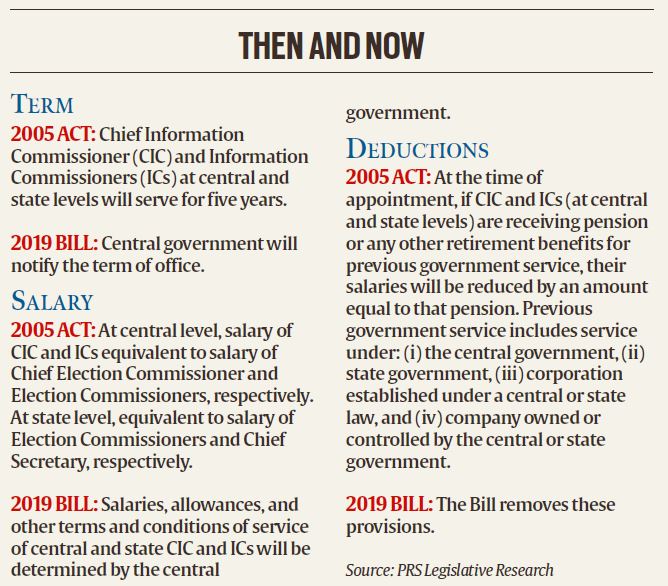Context:
- The government introduced in Lok Sabha the Right to Information (Amendment) Bill, 2019, which proposes to give the Centre the powers to set the salaries and service conditions of Information Commissioners at central as well as state levels. The government’s move triggered protests from the Opposition.
What has changed?
- The Bill amends Sections 13 and 16 of the Right to Information (RTI) Act, 2005. Section 13 of the original Act sets the term of the central Chief Information Commissioner and Information Commissioners at five years (or until the age of 65, whichever is earlier). The amendment proposes that the appointment will be “for such term as may be prescribed by the Central Government”. Again, Section 13 states that salaries, allowances and other terms of service of “the Chief Information Commissioner shall be the same as that of the Chief Election Commissioner”, and those of an Information Commissioner “shall be the same as that of an Election Commissioner”. The amendment proposes that the salaries, allowances and other terms of service of the Chief Information Commissioner and the Information Commissioners “shall be such as may be prescribed by the Central Government”.
- Section 16 of the original Act deals with state-level Chief Information Commissioners and Information Commissioners. It sets the term for state-level CICs and ICs at five years (or 65 years of age, whichever is earlier). The amendment proposes that these appointments should be for “such term as may be prescribed by the Central Government”. And while the original Act prescribes salaries, allowances and other terms of service of the state Chief Information Commissioner as “the same as that of an Election Commissioner”, and the salaries and other terms of service of the State Information Commissioners as “the same as that of the Chief Secretary to the State Government”, the amendment proposes that these “shall be such as may be prescribed by the Central Government”.
Why are Opposition parties protesting?
- The original Act had quantified the tenures, and defined the salaries in terms of existing benchmarks. The amendments are being viewed as implying that, in effect, the terms of appointment, salaries and tenures of the Chief Information Commissioners and Information Commissioners can be decided on a case-to-case basis by the government. The Opposition has argued that this will take away the independence of the RTI authorities. Congress Leader in Lok Sabha Adhir Ranjan Chowdhury said the Bill is a “threat to the independence” of the Central Information Commissioner, while Shashi Tharoor called it an “RTI elimination Bill” that removes the organisation’s independence. Members of the Trinamool Congress, DMK and AIMIM, too, protested, The government had tried to introduce the amendments last year too, but had to withdraw the Bill because of protests from the Opposition.
What are the government’s stated grounds for bringing the amendments?
- The statement of objects says “the mandate of Election Commission of India and Central and State Information Commissions are different. Hence, their status and service conditions need to be rationalised accordingly”. While introducing the Amendment Bill, Minister of State in the PMO Jitendra Singh said, “Probably, the then government of the day, in a hurry to pass the RTI Act, 2005, overlooked a lot of things. The Central Information Commissioner has been given the status of a Supreme Court judge but his judgments can be challenged in the High Courts. How can that exist? Besides, the RTI Act did not give the government rule-making powers. We are merely correcting these through the amendment.”

Under what circumstances were these provisions introduced in the 2005 Act?
- The Bill leading to the original Act had been discussed by the Parliamentary Committee on Personnel, Public Grievances, Law and Justice, which included then BJP members Ram Nath Kovind (now the President), Balavant Apte, and Ram Jethmalani. Originally, the salaries of the Chief Information Commissioners were proposed to be equivalent to those of Secretaries to the Government of India, and the salaries of the Information Commissioners were to be equivalent to those of Additional Secretaries or Joint Secretaries to the Union government. The Parliamentary Committee headed by E M S Natchiappan submitted its report in 2005 and said, “The Committee feels that… it will be desirable to confer on the Information Commissioner (the designation was later renamed CIC) and Deputy Information Commissioners (now ICs), status of the Chief Election Commissioner and the Election Commissioner, respectively. The Committee, accordingly, recommends insertion of a suitable provision in the clause to this effect.”
Over the last 14 years, how far has the RTI Act served the purposes for which it was introduced?
- The RTI Act is regarded as one of the most successful laws of independent India. It has given ordinary citizens the confidence and the right to ask questions of government authorities. According to estimates, nearly 60 lakh applications are being filed every year. It is used by citizens as well as the media. The law is seen as having acted as a deterrent for government servants against taking arbitrary decisions.
Source:IE
